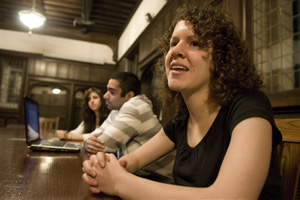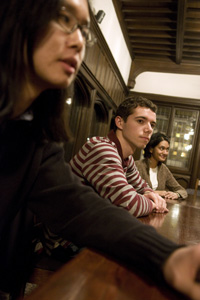Students building a strong group of advocates
By Deva Woodlydeva@uchicago.edu
News Office
 Photos by Lloyd DeGrane Natalie Doss (foreground), Amol Naik (center) and Suzanne Adatto gather for a Chicago Justice Initiative meeting on campus. The group raises awareness about criminal justice issues, and it volunteers in the Chicago community. |
|
 Amol Naik founded the Chicago Justice Initiative after taking the College course in the Public Policy Studies program, Anti-Poverty Policy in the U.S. Inspired by what he had learned, Naik recruited some fellow classmates to help him jump-start the initiative. |
Last year, as a third-year in the College, Amol Naik took a course called Anti-Poverty Policy in the U.S. Taught by Senior Lecturer Chad Broughton, the course inspired him. “I had always had an interest in the law, but that class crystallized it. I realized that you could be at the University for four years and never know about one of the greatest problems plaguing our nation and the community right around the school—and that is mass incarceration.”
As a result, Naik was moved to take action. In the Winter Quarter of 2008, he recruited fourth-years Paymon Khorrami, Monica Malouff and Devika Persaud, as well as third-years Natalie Doss and Eric Wong to constitute the founding executive board of the new organization, the Chicago Justice Initiative. With the help of Debbie Musiker, the undergraduate Pre-Law advisor and faculty sponsor, Naik and the board planned some innovative programs, which combine raising awareness on campus with direct community service.
Since its inception, this young organization has been dynamic in its program offerings, partnering with existing student groups and tapping the faculty resources at the Law School and beyond. The Chicago Justice Initiative hassponsored two forums about the processes of the criminal justice system and the impact of mass incarceration on poor communities and communities of color. The first, “Defending the Poor,” took place in October 2008. The second, organized by Suzanne Adatto and Justin Lepp, and co-sponsored by the UC Dems, “America’s Two Justice Systems,” took place in February.
Besides informational forums, the Chicago Justice Initiative also has offered two courses on criminal justice as participants in events sponsored by SPLASH, the student-run community service RSO, which teaches a variety of courses to Chicago high school students. The most recent five-week course, which Ashley Alger, Jahnavi Bhaskar and Lepp coordinated and taught, pushed students to think about the countless tradeoffs and complications involved with crafting effective criminal justice policies.
“When I was growing up, I kind of just assumed that the justice system was fair. For the students we taught, it was the exact opposite, but we tried to design a curriculum that promoted critical thinking and helped them discuss trade-offs,” Naik said. “One thing that you learn about the criminal justice system is that there are no easy answers.”
Naik seems to have borrowed the approach from Randolph Stone, the co-director of the Criminal and Juvenile Justice Project, a program of the Mandel Legal Aid Clinic, and one of Naik’s former instructors. “Amol was the only undergraduate student in a class that I teach on Race and Criminal Justice. Some students approach the subject as though they have all the answers, but we learn pretty quickly that the problems are much more complex, nuanced and ambiguous than we might have thought.”
 Members of the Chicago Justice Initiative met recently to plan their next service project. From left to right are members Tin Brian Nauyen, Justin Lepp and Jahnavi Bhaskar. Other members include Devika Persaud and Paymon Khorrami. |
|
Ever since Naik stood out as a student, Stone has served as a sounding board for the Chicago Justice Initiative. “I have been pleased that there is so much interest among undergraduates and that they are organizing and educating themselves about the administration of criminal justice in this country,” said Stone.
Naik takes the educative mission of the initiative seriously. “One of the things that’s most struck me as I learn more about criminal justice is that there is always more to learn.” And members of the Chicago Justice Initiative work to ensure that people outside the criminal justice system are not the only ones who should have the opportunity to learn.
Recently, the Chicago Justice Initiative hosted a book drive for incarcerated individuals in Illinois, which Jackie Whitworth, Alger and Bhaskar helped to organize. “I was amazed. We collected 300 books in one hour on a random Tuesday in February.” The students had so much success that they are planning another drive at the end of the Spring Quarter. “If we target the end of the school year, we could get hundreds of books that people might otherwise throw away.”
Future programs include a collaborative forum, which Victoria Alvarez and Doss are coordinating with the School of Social Service Administration, on the topic of gangs in Chicago. “We want to get all sides of the impact out there. We will be recruiting police officers, ex-gang members and scholars to be part of the panel,” Naik explained. Alger and Bhaskar also plan to organize tutoring services to ex-felons at a community-based, re-entry program housed at the Michael Barlow Center on the near West Side.
These days, Naik, now a fourth-year, is planning to hand over the reins. “It’s kind of incredible to look back and see that we really have done a lot in just one year,” said Naik with a smile. When asked about the future of the Chicago Justice Initiative, Naik responds, “We have a very strong board and many dedicated members, and we’ve always been a very collaborative group. I’m confident that they’ll keep doing exciting work.”
![[Chronicle]](/images/sidebar_header_oct06.gif)